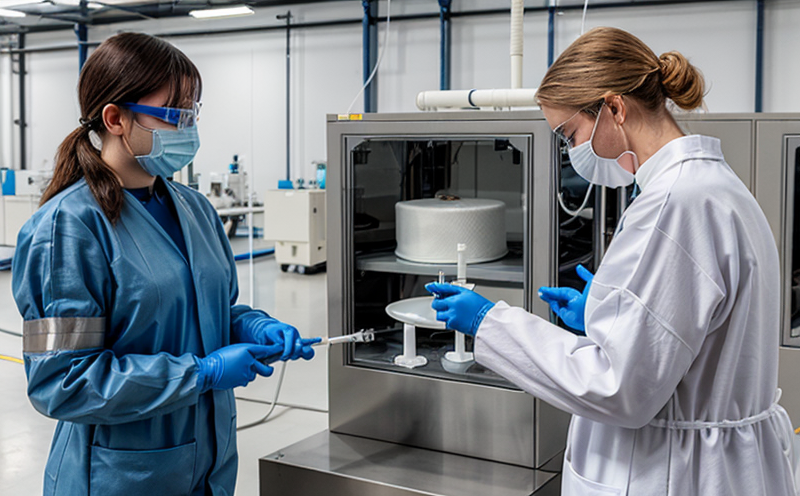Testing for chemical residues in textile composites and technical fabrics
Unlocking Safety and Compliance Testing for Chemical Residues in Textile Composites and Technical Fabrics
In todays fast-paced business environment, ensuring the safety and quality of products is paramount. One critical aspect of product testing that often goes unnoticed is chemical residue analysis in textile composites and technical fabrics. These materials are ubiquitous in various industries, including aerospace, automotive, medical, and sports equipment manufacturing. However, they can harbor hidden dangers in the form of residual chemicals from processing, treatment, or other sources.
At Eurolab, we understand the importance of testing for chemical residues in textile composites and technical fabrics. Our state-of-the-art laboratory services provide businesses with the peace of mind that comes with knowing their products meet stringent quality and regulatory standards. In this article, well delve into the world of chemical residue analysis, exploring its significance, benefits, and what to expect from our expert laboratory team.
What is Testing for Chemical Residues in Textile Composites and Technical Fabrics?
Textile composites and technical fabrics are engineered materials designed for specific applications. They can be made from natural or synthetic fibers, blended with various chemicals, coatings, or finishes to enhance their performance. However, during the manufacturing process, residues of these chemicals may remain on the fabric surface or within its matrix. These chemical residues can pose health risks to consumers and workers handling the products, as well as environmental hazards.
Eurolabs laboratory services offer a comprehensive range of testing methods to detect and quantify chemical residues in textile composites and technical fabrics. Our team uses cutting-edge technologies, such as gas chromatography-mass spectrometry (GC-MS) and liquid chromatography-tandem mass spectrometry (LC-MS/MS), to identify and measure the presence of various chemicals, including
Volatile organic compounds (VOCs)
Heavy metals
Pesticide residues
Solvents
Flame retardants
Why is Testing for Chemical Residues in Textile Composites and Technical Fabrics Essential?
The consequences of ignoring chemical residue analysis can be severe. Non-compliance with regulatory requirements, product recalls, and damaged brand reputation are just a few potential outcomes. On the other hand, adopting a proactive approach to testing and ensuring the safety of your products can bring numerous benefits
Advantages of Using Eurolabs Testing Services
Compliance with Regulations Stay ahead of industry standards and regulatory requirements by identifying and mitigating chemical residue risks.
Product Safety and Liability Protection Ensure consumer protection and minimize liability risks associated with product contamination or health hazards.
Brand Reputation Enhancement Demonstrate a commitment to quality, safety, and sustainability, boosting customer trust and loyalty.
Cost Savings Avoid costly recalls, rework, and potential legal disputes by identifying and addressing chemical residue issues early on.
Supply Chain Confidence Build confidence in your suppliers and manufacturing processes by verifying the quality of your materials.
Environmental Sustainability Contribute to a safer environment by reducing the risk of chemical contamination and promoting eco-friendly practices.
How Does Eurolabs Testing Service Work?
At Eurolab, our expert team follows a structured process to ensure accurate and reliable results
Sample Collection and Preparation Our trained technicians collect and prepare samples according to specific protocols and regulatory requirements.
Testing Methods Selection We select the most suitable testing methods based on the type of chemicals suspected or the products specific requirements.
Analysis and Reporting Our state-of-the-art equipment performs precise analysis, generating detailed reports that include identification, quantification, and concentration levels of detected chemical residues.
QA Section Frequently Asked Questions
What types of textiles can be tested for chemical residues?
Eurolabs testing services are suitable for a wide range of textile composites and technical fabrics, including polyester, nylon, cotton, wool, and blends.
How long does the testing process take?
Turnaround times vary depending on the complexity of the analysis, but most tests can be completed within 5-14 working days.
What are the typical costs associated with chemical residue testing?
Prices vary based on the specific testing requirements and sample quantities. Our team will provide a detailed quote after receiving your samples.
Can I send in my own sampling equipment or containers?
We recommend using our sampling containers to ensure sample integrity and prevent contamination.
Conclusion
Testing for chemical residues in textile composites and technical fabrics is an essential step towards ensuring product safety, compliance, and brand reputation. By partnering with Eurolabs expert laboratory services, businesses can navigate the complexities of chemical residue analysis with confidence. Our team stands ready to support your quality control and assurance initiatives, helping you unlock a safer, more sustainable future for your customers and the environment.
Get in touch with us today to learn more about our testing services or to schedule a sample collection. Together, we can ensure that your products meet the highest standards of safety, quality, and regulatory compliance.




